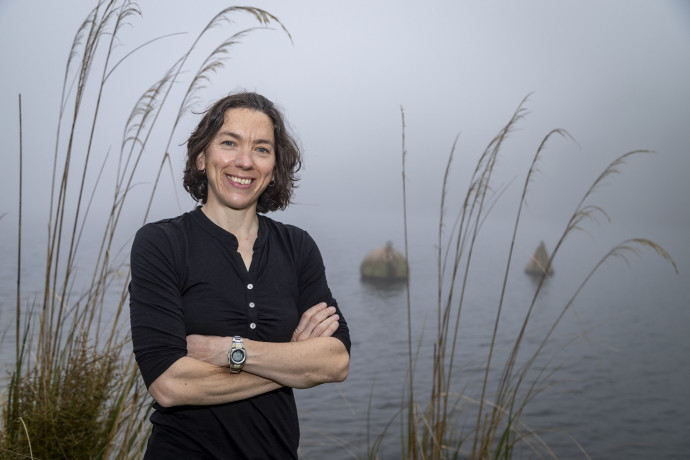Dr Greer Gilmer

The precarity of Covid left Greer rethinking the future for her young family, until a Whitinga Fellowship allowed her to continue her career as a climate researcher at GNS Science in Ōtepoti Dunedin.
Q. Tell us about your research.
I’m a paleo climatologist. I’m interested in reconstructing changes in the Southern Hemisphere westerly wind, because they are a really important driver of our climate in Southern Hemisphere. They drive changes in rainfall and storms, and they help regulate carbon dioxide exchange between the ocean and the atmosphere, which is really important for the Southern Ocean as a carbon sink.
I analyse sediments collected in fjords, or lakes, or peat bogs and reconstruct rainfall and wind strength since the Last Glacial Maximum in the last 20,000 years. When the westerly winds change, the weather and climate in the Southern Hemisphere change as well. Looking at the past gives us a much better idea about what may happen in the future.
Q. What got you started in your research?
One thing I really, really love about the job is doing field work. That was the reason I started doing geology. I get to go to really nice places and the work is hard, and its cold, and it snows, and it rains, and you get saturated, but it turns out you’re still having a good time. It’s great to be part of a research team.
I completed my undergraduate and Masters at the University Canterbury, Christchurch, travelling to the Dry Valleys, Antarctica to investigate the depositional environment of Devonian age sediments.
Afterwards, I worked as an engineering geologist and site engineer on projects around New Zealand, particularly in Christchurch before, during, and following earthquakes. But I wanted to return to research, so I went back to do my PhD at Otago, reconstructing climate in the Southern Hemisphere.
Q. How did Covid impact on your career?
Because of Covid, the timing was really bad. I’d just handed in my PhD in February 2020, and there was lockdown in March and the whole entire country, and the whole entire world. It was really hard to get into the country, it was really hard to get out of the country. There were cuts in funding and things that were advertised were taken away.
We chose as a family to not go overseas, as we had originally planned, because New Zealand was safer for our young family in a Covid situation. It was really difficult, and it felt really unsafe with other countries’ Covid policies. But also, we knew my husband might not get a job overseas, so going away was not necessarily a good idea financially for us either, because we’d both be going somewhere we didn’t have an income.
There were no opportunities in New Zealand either. There was no funding, no other post-doc opportunities in my field. I was applying for funding for a very limited pool of money, like every other early career researcher in New Zealand.
I feel very privileged that I was able to get the Whitinga and to be able to do research that I really love.
Without this Fellowship, I would probably be doing precarious work, or be unemployed. I would have had to move outside research or to find employment somewhere else, or we would have had to move.
If I hadn’t got the Whitinga it would have affected the whole of my family, and the burden would have been on my husband. Our children are one and five, and we would have had to move them. It was a very scary time.
Q. Who has supported you in your research?
My family! It has also been really important for me to have female supervisors.
With one of her PhD Supervisors Dr Christina Riesselman (L) and one of her MSc Supervisors Dr Margaret Bradshaw (R)
Q. How else has being a Whitinga Fellow made a difference?
I’ve been able to work at GNS Science, working with different people and expanding my knowledge, which has been fantastic.
This scholarship is opening up opportunities for me to build relationships with iwi in the South Island, where a lot of my research is based. That’s really important for me, so I can create better science. I can ask them how what we’re doing can help them or if it can answer any questions that they want to know, about mahinga kai or how the environment is going to change.
I’ve also be fortunate to work with lots of collaborators, such as the Korea Polar Institute during my PhD research, scientific collaborators at the University of Otago and other institutions across New Zealand and the world.
The Fellowship has allowed me to establish myself as part of the research community. It’s such a privilege to be able to do research that I love.
